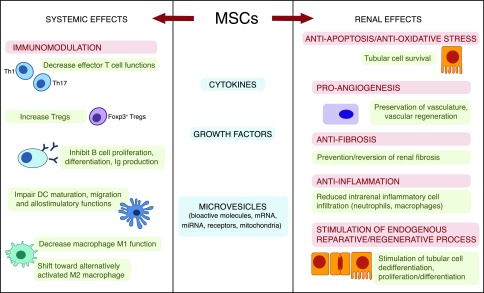Figure 1.
MSCs exert their potential beneficial effects both systemically and at the renal level. MSCs, either constitutively or through crosstalk with target cells, release a multitude of cytokines, growth factors, and microvesicles that can inhibit the inflammatory functions of adaptive and innate immune cells and promote the development of regulatory cell populations, such as CD4+Foxp3+ Tregs, M2 macrophages, and myeloid-derived suppressor cells (MDSCs), with their own renoprotective effects. MSC secretome protects tubular cells from apoptosis and oxidative stress, favors angiogenesis, prevents/reverses renal fibrosis, inhibits inflammatory cell infiltration, and stimulates the endogenous process of renal repair. DC, dendritic cell; miRNA, micro RNA; Th, CD4+ T helper cell.

